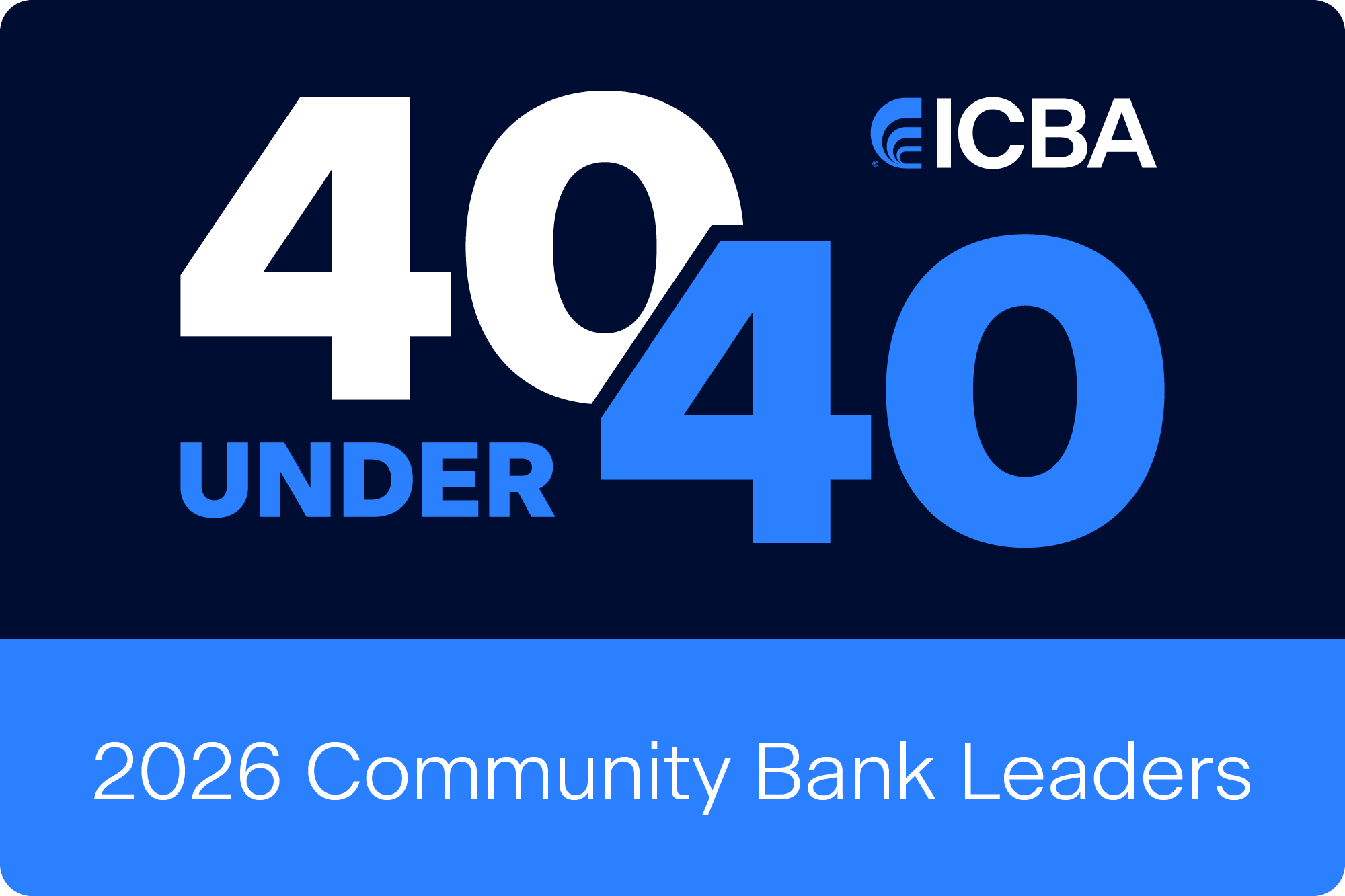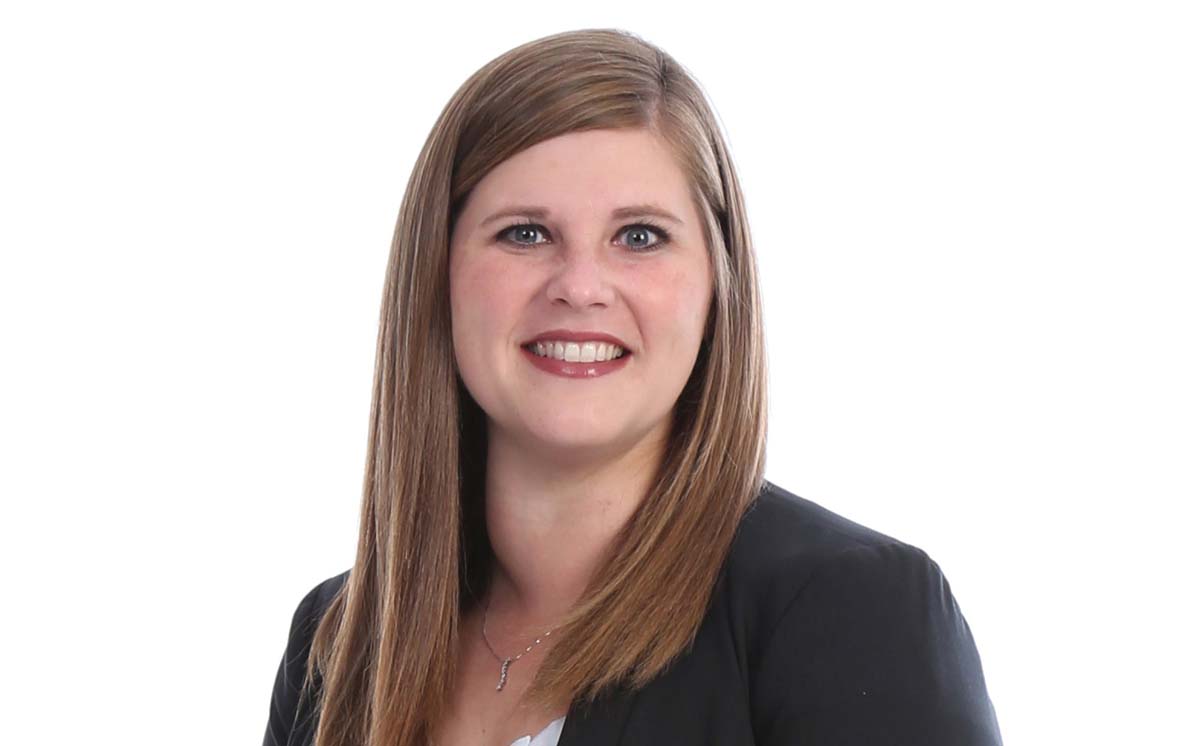Faced with the unexpected and unexplainable, it’s hard to stay on course. But Robert Fisher is an expert at just that. Between his time as an Air Force navigator and his love for fast cars, ICBA’s next chairman is ready to help community banks and the customers they serve power through the coming year.
New ICBA chairman Robert Fisher is in the driver’s seat
March 01, 2021 / By Colleen Morrison
Faced with the unexpected and unexplainable, it’s hard to stay on course. But Robert Fisher is an expert at just that. Between his time as an Air Force navigator and his love for fast cars, ICBA’s next chairman is ready to help community banks and the customers they serve power through the coming year.
In the sometimes tricky terrain of community banking, ICBA calls upon its leadership to help plot a course through the intricacies of industry developments. And who better to take on that role than a former U.S. Air Force navigator?
“My dream growing up was to become a pilot,” says Robert “Bob” Fisher, who this month assumes the role of ICBA chairman. “I accepted an Air Force ROTC scholarship to go to college, but I lacked 20/20 vision, so that prevented me from becoming a pilot. The Air Force was still kind enough to let me fly, but as a navigator instead.”
With a military career as his launching point, what made Fisher go from Air Force to community banking? Given that his great-great grandfather founded Tioga State Bank in Spencer, N.Y., in 1864, community banking pulsed through his veins. Couple that with the fact that he and his wife were looking to start a family, and the lure of coming back home to both his hometown and community banking was strong.
“Early on in my career, my dad said to me, ‘Don’t view yourself as an owner of the bank; view yourself as a caretaker and make it better for the next generation.”—Robert Fisher, ICBA Chairman
“I loved flying and the camaraderie of flight crews, but I was also newly married and not a huge fan of bureaucracy and red tape,” Fisher says. “I was also on the road 180 days of the year, which wasn’t really conducive to starting a family, so my wife and I jointly decided that maybe going back home to the family business was not such a bad thing.”
And thus, his career in community banking took flight. Although he was on the CEO track, coming back to Tioga State Bank did not mean starting in an executive position. His father wanted him to be well versed in all areas of the business. Fisher had worked as a teller prior to his military service, so he started as an assistant office manager, working his way through multiple positions, including operations, commercial lending and beyond.
Today, Fisher serves as chairman, president and CEO of Tioga State Bank, which has $530 million in assets. The work has tested his navigation skills in leading the bank through the economy’s highs and lows, including the COVID-19 pandemic. With his eye on the shifting landscape, Fisher focuses on continuous improvement to benefit his customers and community.
“Early on in my career, my dad said to me, ‘Don’t view yourself as an owner of the bank; view yourself as a caretaker and make it better for the next generation,’” he says. “That’s how I’ve always viewed my role at the bank.”

The strength of the crew
For Tioga State Bank, that caretaker role starts with the staff culture, which is something the community bank takes seriously. In fact, four years ago, the bank set its sights on being recognized as a top bank to work for within the industry. Tioga State Bank has since been featured as a top workplace multiple times.
“As a family bank, we try to treat our staff like family,” Fisher says. “We work hard, but we have fun doing it. It is something we are pretty proud of.”
In addition to the strength of his staff, Fisher emphasizes the importance of having a robust network of community bankers to bring new ideas to the table. In fact, he cites access to other bankers as crucial in shaping his own institution’s developments.
“I’ve always tried to connect with bankers who I respect and admire, and making those connections has been tremendously valuable,” he says. “Every time I go to a meeting and talk to people, I find something that I can bring back to the bank and implement. Those connections can help make you as a person better and make your institution better.”
Fisher credits ICBA as the primary source for many of these relationships over the years. He interacted with ICBA for the first time when he was just 9 years old, when his grandfather took his family to ICBA LIVE in Honolulu, Hawaii. He has great memories of that experience, and if this year’s convention had taken place in person, he would be coming full circle, starting his chairmanship in that same location.
Beyond that first exposure, ICBA LIVE holds a special place in Fisher’s heart and may have been the driving force behind his chairmanship today. When his friend and colleague Salvatore “Sal” Marranca, ICBA’s chairman from 2011 to 2012, asked him to give the opening invocation at the convention, the experience had a profound impact on Fisher.
“I can still remember being on the stage with bright lights and being in front of a couple thousand community bankers—[it was] kind of inspiring,” he says.
Emphasis on technology
Now, he’s taking center stage as ICBA chairman during one of the most difficult times in the modern history of banking. COVID-19 has wreaked havoc on the nation (see the sidebar on page 44) and the effects of those issues will reverberate throughout the banking industry for years. “The pandemic will forever impact how people bank and how people want to bank as we go forward,” Fisher says.
One of his focal points in the coming year is emphasizing the need for community banks to focus on technology. “A goal I have is trying to help other community bankers understand the need for continued innovation, the need for the digital experience,” Fisher says.
He emphasizes that analysts predict continued reliance on and migration to digital services. For example, PYMNTS.com research reveals that 84% of consumers who embraced digital solutions for retail products amid COVID-19 plan to stay the course post-pandemic. When it comes to banking specifically, Accenture found that 50% of consumers now interact with their bank through mobile apps or websites at least once a week. What’s more, 46% would be willing to do video calls with their banker even when branches are open and 35% prefer it to face-to-face meetings.
But digital transformation doesn’t come without its challenges, which Fisher acknowledges. The Accenture report notes that while consumers trust digital offerings on a transactional level, they remain wary of its interface when it comes to counsel: Only 28% said they would trust a human advisor “a lot” delivering advice over a video call, compared with 36% and 48% who said they would trust a human advisor “a lot” delivering advice by phone or in person in a branch, respectively.
“We need to make that high-tech, high-touch connection,” Fisher says. “That’s critical to our business.”

He mentions programs like ICBA’s ThinkTECH Accelerator that support bankers in identifying solutions to meet their innovation-centric priorities. The program’s 2021 cohort introduces companies that specialize in digital transformation and onboarding, customer self-service, know-your-customer (KYC) and Bank Secrecy Act (BSA) and anti-money laundering (AML) services, fraud and risk mitigation, and beyond. “Community banks don’t have the budgets that the big megabanks have, so we’re going to have to figure out ways to partner with fintech companies,” Fisher says. “ICBA’s ThinkTECH Accelerator is the perfect vehicle to figure out which companies are relevant in providing solutions for community banks.”
Looking further into the future, Fisher sees the need for community banks to step up their game when it comes to leveraging their data. “Artificial intelligence is going to come more and more into our industry, and we’ve got to figure out how to utilize it,” he says. “We have a tremendous amount of data. We need to figure out how to utilize that data ourselves and anticipate customer needs and products that they need.”
Lessons from the pandemic
When COVID-19 reared its head in March 2020, Robert Fisher and his team at Tioga State Bank in Spencer, N.Y., were poised to support the needs of the community.
“As a community bank, we’ve always worked with our customers, especially if a customer is having a problem,” he says. “With COVID, we had a lot of our customers experiencing issues, so we knew early on that we would figure out ways to help them.”
The community bank ended up processing more than 500 Paycheck Protection Program (PPP) loans to the tune of $42 million to help local small businesses. These included not only current customers but also any other small businesses in the community that needed support. “We knew with the PPP that we were going to participate to help our small businesses,” Fisher says. “It was really the only lifeline that they had at the start of this, and we knew that we had to do it for their sake.”
While it was a bumpy road, that’s exactly what Tioga State Bank and other community banks around the nation were able to do. Fisher says his connection to ICBA helped him be better positioned to respond to the need.
“It was invaluable to be connected to ICBA during this [time],” he says. “We were all sharing information literally as it was happening, and it was great to be able to share that information with my staff so we that could adjust and anticipate some things that the SBA was coming out with. I’m so thankful and blessed that we had that connection with ICBA and other bankers, because it really made a huge difference in our ability to help our customers out.”
So, coming out of this experience, what does he see as the key lessons?
“As a small business ourselves, agility was pretty key to being able to adjust on the fly. Plan for uncertainty and be flexible,” Fisher says. “I think those played out pretty well for our bank.”
Other priorities
Beyond banking innovation, Fisher points to a level playing field as a key topic on his agenda as chairman.
“We’re fighting for a tiered regulatory framework for community banks,” he says. “We will continue to press upon our legislators and regulators that we’re relationship focused, not transaction focused.”
Fisher’s priorities extend to the credit union imbalance as well. The tax savings that credit unions receive allows them to offer lower interest rates to borrowers, which creates an unfair advantage over community banks. In addition, this tax shelter means credit unions don’t support their communities with tax revenue the way community banks do.
“I’m hopeful that we can get some leverage and start to help people understand the difference between a credit union and a community bank,” Fisher says.
He’s also keeping a cautionary eye on the payments system. With so much activity of late—from talk of a central bank digital currency to technology giants dipping their toes into the payments pond—he feels community banks need to keep making their voices heard.
“One of the concerns I have is protecting the payments system the way it is set up now,” he says. “Nonbanks are looking to access the payments system, and trying to get an OCC charter, which would potentially give them access.”
Above all, Fisher hopes that community banks can get back to some sense of normalcy during the course of his chairmanship. While that may look different than it has in the past, community banks are up for the challenge by keeping their focus on their communities. That spotlight on the customer will be what differentiates community bankers from others in financial services, he believes. If they rely on that as their guide, Fisher feels community banks will stay on course, doing what’s right for their banks and communities.
“I still see our industry thriving 10 years from now,” he says. “I see a lot of our customers and communities becoming more focused on the importance of local. We’re trying to connect the dots, and say, ‘Bank local, too. It’s just as important to our community to keep money spent and money deposited in the community.’ I’m confident our model of relationship banking will continue to thrive.”
In the driver’s seat

As a navigator for the U.S. Air Force, Bob Fisher has always had a propensity for speed, which also applies to his on-the-ground hobbies. “I love cars. I am a huge car guy. I like to go fast,” he says.
Fisher shared that one of his most memorable trips was with his son, Josh, following his 2015 college graduation. The two embarked upon a car-centric experience in Germany, touring the Porsche museum and factory in Stuttgart and cruising the autobahn.
“I think I did 156 miles an hour with my son in the car,” he says. “He was kind of white-knuckled, but it was fantastic. We had a great time.”
Fisher’s love of German ingenuity means he has a few cars in his personal collection that support his need for speed, including a 1995 Porsche 911 993 C2, a much-beloved sports car. Coupled with the fact that the Watkins Glen International (WGI) racetrack is just 45 minutes away, Fisher has a way to fuel his fast-paced passion.
“I’ve done a few high-performance driving events at WGI,” he says. “I’m a wannabe race car driver.”
Subscribe now
Sign up for the Independent Banker newsletter to receive twice-monthly emails about new issues and must-read content you might have missed.
Sponsored Content
Featured Webinars
Join ICBA Community
Interested in discussing this and other topics? Network with and learn from your peers with the app designed for community bankers.
Subscribe Today
Sign up for Independent Banker eNews to receive twice-monthly emails that alert you when a new issue drops and highlight must-read content you might have missed.
News Watch Today

Join the Conversation with ICBA Community
ICBA Community is an online platform led by community bankers to foster connections, collaborations, and discussions on industry news, best practices, and regulations, while promoting networking, mentorship, and member feedback to guide future initiatives.













